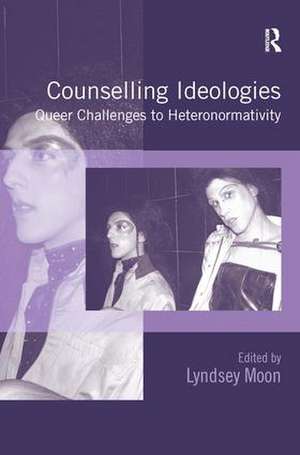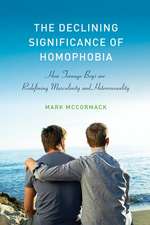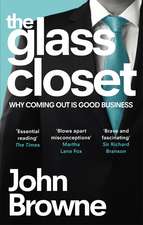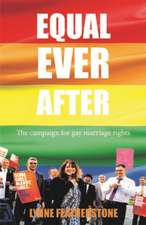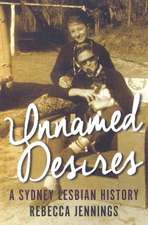Counselling Ideologies: Queer Challenges to Heteronormativity
Editat de Lyndsey Moonen Limba Engleză Hardback – 28 apr 2010
| Toate formatele și edițiile | Preț | Express |
|---|---|---|
| Paperback (1) | 451.94 lei 6-8 săpt. | |
| Taylor & Francis – 23 noi 2016 | 451.94 lei 6-8 săpt. | |
| Hardback (1) | 1054.71 lei 6-8 săpt. | |
| Taylor & Francis – 28 apr 2010 | 1054.71 lei 6-8 săpt. |
Preț: 1054.71 lei
Preț vechi: 1286.24 lei
-18% Nou
Puncte Express: 1582
Preț estimativ în valută:
201.82€ • 208.21$ • 168.42£
201.82€ • 208.21$ • 168.42£
Carte tipărită la comandă
Livrare economică 27 martie-10 aprilie
Preluare comenzi: 021 569.72.76
Specificații
ISBN-13: 9780754676836
ISBN-10: 0754676838
Pagini: 250
Dimensiuni: 156 x 234 x 16 mm
Greutate: 0.45 kg
Ediția:1
Editura: Taylor & Francis
Colecția Routledge
Locul publicării:Oxford, United Kingdom
ISBN-10: 0754676838
Pagini: 250
Dimensiuni: 156 x 234 x 16 mm
Greutate: 0.45 kg
Ediția:1
Editura: Taylor & Francis
Colecția Routledge
Locul publicării:Oxford, United Kingdom
Notă biografică
Lyndsey Moon is an ESRC Senior Research Officer based at Warwick University
Recenzii
'It is easy to accept the heteronormative consciousness that informs and influences all aspects of psychotherapy. But it does not make it right. Queer theory offers radical insights into therapeutic logic and this book provides new and challenging perspectives on sex, gender and sexualities while giving language, communication, text and practice careful consideration. Questioning the process of therapy, this book offers ideas on reflection for practice and the development of theory in these areas.' Stephen Palmer, City University London, UK 'Counselling Ideologies: Queer Challenges to Heteronormativity offers a timely and significant interrogation of the transforming terrains of sexuality and psychology. The authors in this collection take up a number of critical questions concerning the constraints of heteronormative counselling ideologies on counselling practice and explore the expansive terrains of queer politics and queer theory to rethink both. The collection bridges theory and practice, drawing together insights from cultural studies of sexuality to refresh and reinvigorate the applied, professional dimensions of counselling and psychology. An excellent text.' Deborah Lynn Steinberg, University of Warwick, UK 'These searching and critical essays provide a much needed challenge to the mainstream languages and practices of counselling whose imageries of heterosexuality, family life and monogamy are here under fire. This book will be a significant challenge to counsellors and a call to arms for queer theorists.' Ken Plummer, University of Essex, UK 'This book engages mostly professionals from the field of psychotherapy and deploys the practical dimension of operationalized de-historicizing of the underlying heteronormative templates within the scientific establishments of psychic care. The two ambitions - enacting deheterosexualization of therapy and showing resisting therapeutic practices - reveal substantial chunks of the heterosexualist paradigm in present
Cuprins
Part I De/Heterosexualising Therapy; Introduction, Lyndsey Moon; Chapter 1 Anti-Sectarian, Queer, Client-Centredness, Tina Livingstone; Chapter 2 Queerying Freud, Ian Hodges; Chapter 3 Queer Family Therapy – A Contradiction in Terms?, Alex Iantaffi; Chapter 4 Towards a Queer Praxis, Lyndsey Moon; Part II Relations of Resistance and Contestation; Chapter 5 Heteronormativity and Queer Youth Resistance, Julie Tilsen, David Nylund; Chapter 6 The Colour of Queer, Catherine Butler, Roshan das Nair, Sonya Thomas; Chapter 7 ‘I Did It My Way …’, Christian Klesse; Chapter 8 Multiple Identities, Multiple Realities, Mark Casey; Chapter 9 Beyond Cisgenderism, Y. Gavriel Ansara; Chapter 10 Azima ila Hayati – An Invitation in to My Life, Sekneh Beckett; Chapter 11 Cultural Competence with BDSM Lifestyles, Dossie Easton;
Descriere
Counselling Ideologies draws on both academic experts and practitioners from the UK, USA and Australia, to represent a new approach to counselling and psychotherapy. It will appeal not only to sociologists and those working in the field of mental health, but also to scholars of race and ethnicity, gender, queer studies and queer theory.
